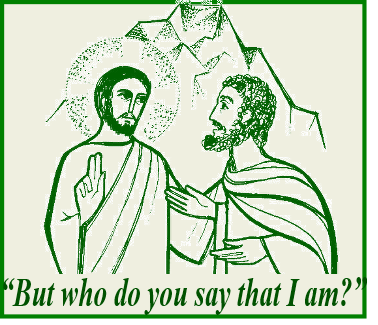Readings: Isaiah 22:19-23; Romans 11:33-36; Matthew 16:13-20
Theme: ‘But who do you say I am?’ (Mt 16:15)
At the foot of Mount Hermon, on the border between Israel and Syria, where the river Jordan rises, King Herod the Great built a magnificent temple in honour of the Roman Emperor, Caesar Augustus. Herod’s son and successor, Philip, went on to establish a town there, naming it Caesarea and adding his own name to it, thus becoming Caesarea Philippi. Along with a group of pilgrims, I had the opportunity to visit this beautiful spot, known today as Banias, in the Spring of 2008. It was in this place that the scene described in today’s gospel took place.
The scene begins with Jesus conducting an opinion poll among his disciples about his identity. He asks them: ‘Who do the people say the Son of Man is? (Mt 16:13). In referring to himself as the Son of Man, Jesus is identifying himself with the Messianic figure mentioned in the Book of Daniel, the divinely chosen leader sent by God to end Israel’s oppression, and establish God’s reign of justice, peace and integrity (cf. Daniel 7:13-14). The response of the disciples shows that the people see him as a great prophet, a spokesperson for God, like Elijah, Jeremiah or John the Baptist, but no more than that.
Jesus makes no comment on the results of the poll because he has an altogether more pointed and personal question to put to his closest companions, those who shared his life on a daily basis, witnessed his miracles, heard him preach and saw him pray: ‘But you, who do you say I am’? (Mt 16: 15). This question is, in the words of Father Simeon, a Trappist monk, the ‘hopeful query of a Lover who needs to know to what extent he is known, understood, and accepted in his deepest identity by those he loves, those to whom he has been at pains to manifest himself’. Simon, assuming a leadership role among the apostles, responds: ‘You are the Messiah, the Son of the living God’ (Mt 16:16). With these words, Simon is clearly confessing that Jesus, their teacher and guide, is indeed the long-awaited Messiah, the one in whom God’s promises for the people of Israel are being realised. Clearly pleased with Simon’s response, Jesus affirms it as divinely inspired and declares Simon blessed: ‘Blessed are you, Simon, son of Jonah! For it was not flesh and blood that revealed this to you but my Father in heaven’ (Mt 16:17).
Jesus then goes on to give Simon a new name, a new identity, a new authority within the community he is forming, and an awesome promise in relation to the future: ‘And I tell you, you are Peter, and on this rock I will build my Church, and the gates of the underworld can never hold out against it’ (Mt 16: 18). Peter (taken from the Aramaic root word for ‘rock’) is to become the rock, the foundation of the community that will carry the name and the authority of Jesus to the whole world. On him, together with his Apostolic companions as the faithful communicators of Jesus’ life and message, Jesus will build his Church, a Church that will endure, despite the assaults of the Evil One and his minions.
We have here a testimony to the firmness of a foundation whose strength basically comes from the authority of Jesus and his promise to Peter: ‘I will give you the keys of the kingdom of heaven, and whatever you bind on earth will be bound in heaven, and whatever you loose on earth will be loosed in heaven’ (Mt 16:19). These words echo the promise made by the Lord to Eliakim in our first reading from the prophet Isaiah: ‘I place the key of the House of David on his shoulder; should he open no one shall close; should he close no one shall open (Is 22:22). Jesus is conferring on Peter a unique role of authority in the Church. He is the one whose decisions in faith will be confirmed by God.
Catholics consider the Pope the successor of Peter, sharing the same charism or gift of leadership the Jesus conferred on Peter. This leadership is not one of coercion and political power, but of example and service. Traditionally the Pope has been called the ‘servant of the servants of God’. The Pope is not a dictator. He does not decide what the members of the Church should believe. Rather, he communicates to the Church at large what it already believes. He is the focal point of unity of the Church’s one faith and communion in the Spirit. He is the servant of the community of believers, united in one faith.
In the Church today, where there are so many different, and often conflicting, understandings of Jesus and what it means to be his disciples, the role of the Pope as a focal point of unity is perhaps more important than ever. However, it is a demanding and difficult role, as Pope Francis, has stated on numerous occasions. At present Francis is striving to reform the Church in the service of Christ’s mission of love, truth and justice through a synodal process launched two years ago. We should not only pray for Pope Francis and for the success of the ongoing synodal process. We should also take him as our reference point in our own efforts to understand the One whose mission we serve and who is also asking us today: ‘Who do you say that I am?
Michael McCabe SMA
To listen to an alternative Homily for this Sunday, from Fr Tom Casey of the SMA Media Centre, Ndola, Zambia please click on the play button below.
|
|

